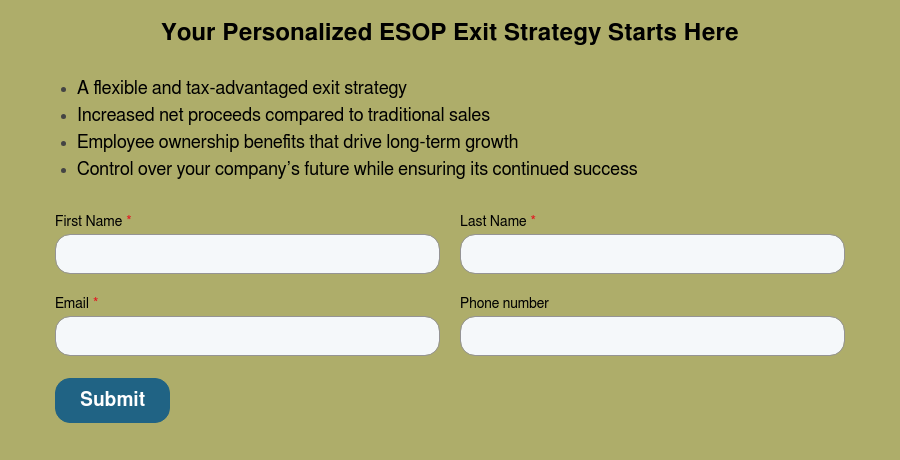Industry Trends
Largest Transactions Closed
- Target
- Buyer
- Value($mm)
Last updated:
Selling to an Employee Stock Ownership Plan (ESOP) is a powerful and flexible strategy for family-owned businesses navigating succession. It allows families to retain company values, offer liquidity to inactive members, and preserve legacy, all while gaining significant tax advantages.
PCE Insight: In our experience, family businesses that use ESOPs report stronger cultural continuity and better succession alignment than those that transition to private equity or third-party buyers.
Family-owned businesses are the foundation of the private sector, making up over 60% of privately held U.S. companies (Family Enterprise USA); yet, most don’t survive into the third generation.
Only 40% of family businesses make it to the second generation, 12% to the third, and just 3% survive into the fourth (Silvercrest Asset Management Group).
Reasons include:
PCE Insight: In our experience, a significant number of business owners are unprepared for the family dynamics that can complicate ownership transitions.
For owners facing these challenges, Employee Stock Ownership Plans (ESOPs) offer a rarely understood but highly effective solution.
An Employee Stock Ownership Plan (ESOP) is a qualified retirement plan that invests primarily in the stock of the employer. It allows employees to become beneficial owners without controlling the business.
An ESOP allows business owners to sell shares to a trust that benefits employees, while maintaining company control and offering substantial tax advantages.
For family businesses, this unlocks meaningful options:
.jpg?width=609&height=306&name=Keeping-Family-Businesses-in-the-Family-Chart%20(1).jpg) PCE Insight: Many of our family-business clients discover they don’t have to choose between keeping the business or keeping the family together — an ESOP can do both.
PCE Insight: Many of our family-business clients discover they don’t have to choose between keeping the business or keeping the family together — an ESOP can do both.
Example: A second-generation owner can sell 30% of the company to an ESOP for liquidity while gifting shares to children still active in the business.
As family companies grow, they often rely on non-family employees in key roles. These employees become part of the firm’s cultural DNA, even if they don’t share a last name.
Selling to an ESOP allows these long-serving team members to share in the success they helped create, without requiring the founding family to give up control.
ESOPs often expand the meaning of “family,” creating ownership opportunities for those who helped build the business.
At PCE, we've seen this foster a deepened culture of accountability, pride, and stewardship, a powerful legacy for any founder to leave behind.
For family-owned businesses navigating succession, ESOPs offer:
For a deeper look at how ESOPs can balance liquidity and legacy, see our post: ESOP Is the Answer — What Was the Question?
Sustaining employee ownership long-term requires planning. Our guide on ESOP sustainability outlines how to keep it working into the next generation.
Curious about the tax impact? Here's how ESOP tax incentives benefit both selling shareholders and the business.
To understand the process in more detail, see: How an ESOP Works
An ESOP is worth exploring if your family business:
Not every company is the right fit, but many are. Explore our guide, Is an ESOP Right for You?, to see how your business stacks up.
Selling all or a portion of the family-owned business to the employees through an ESOP is often a natural and comfortable transition, and it allows the culture of the company to remain intact while giving the family ultimate flexibility to meet the needs of all family members.
At PCE, we’ve guided hundreds of family businesses through successful ESOP transitions — preserving culture, delivering liquidity, and strengthening legacy.

Investment Banking | ESOP
wstewart@pcecompanies.com
Orlando Office
407-621-2100 (main)
407-621-2124 (direct)
407-621-2199 (fax)
Investment Banking | ESOP
Orlando Office
407-621-2124 (direct)
wstewart@pcecompanies.com
Connect
407-621-2124 (direct)
407-621-2199 (fax)